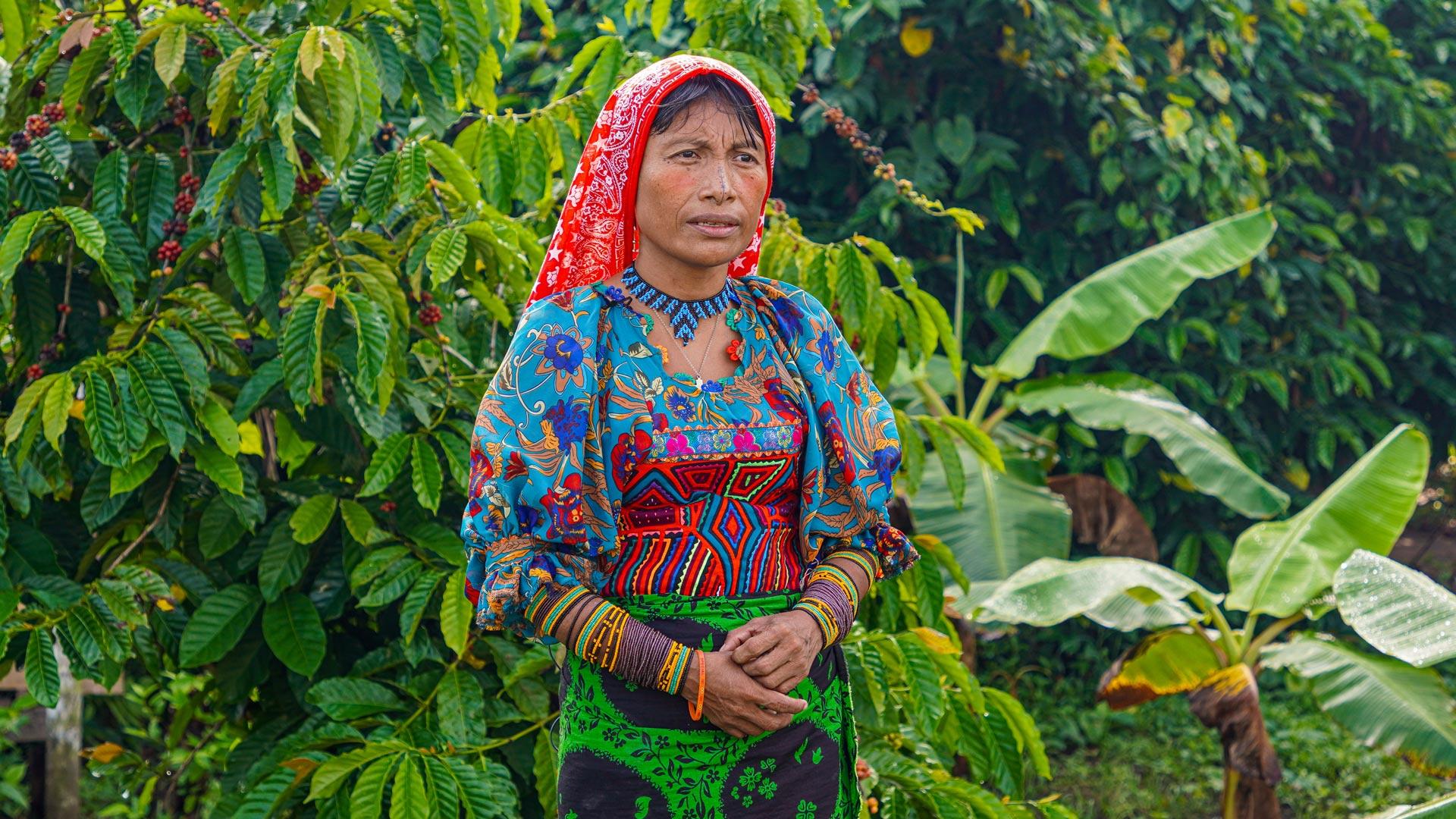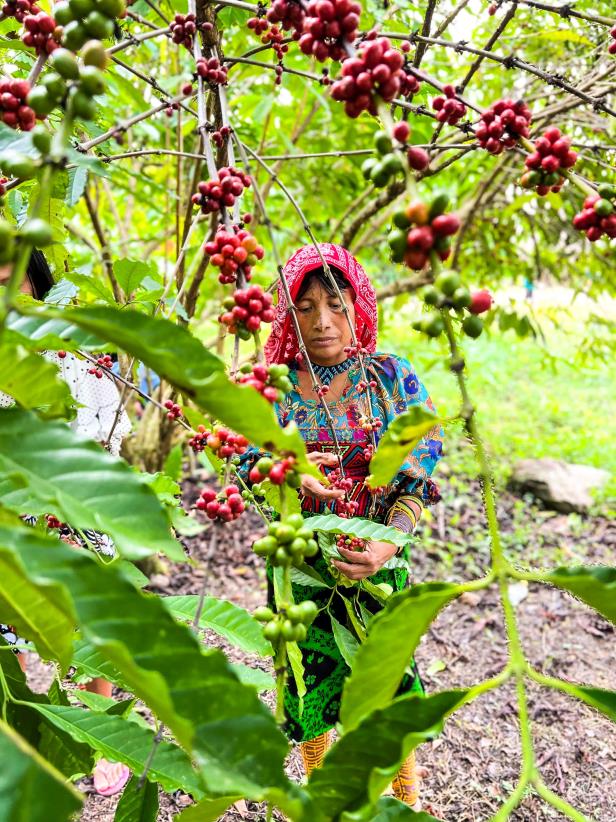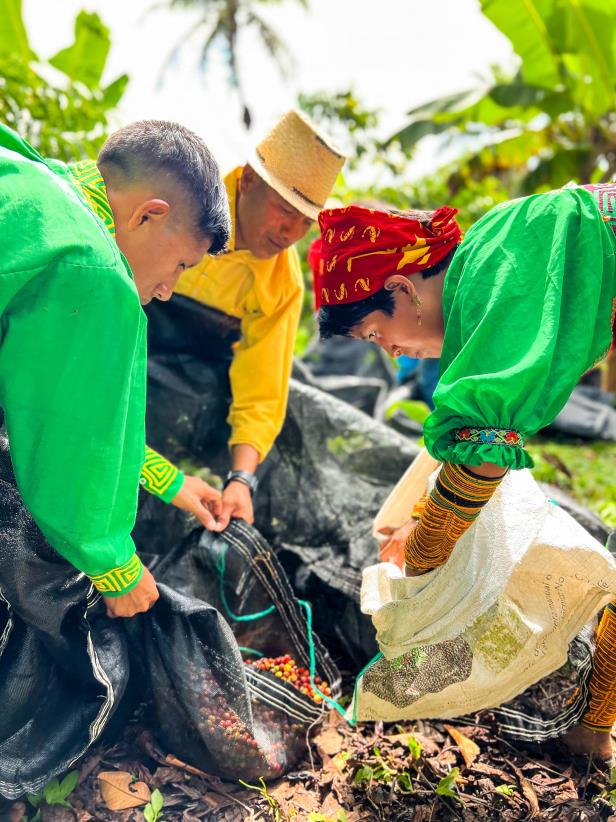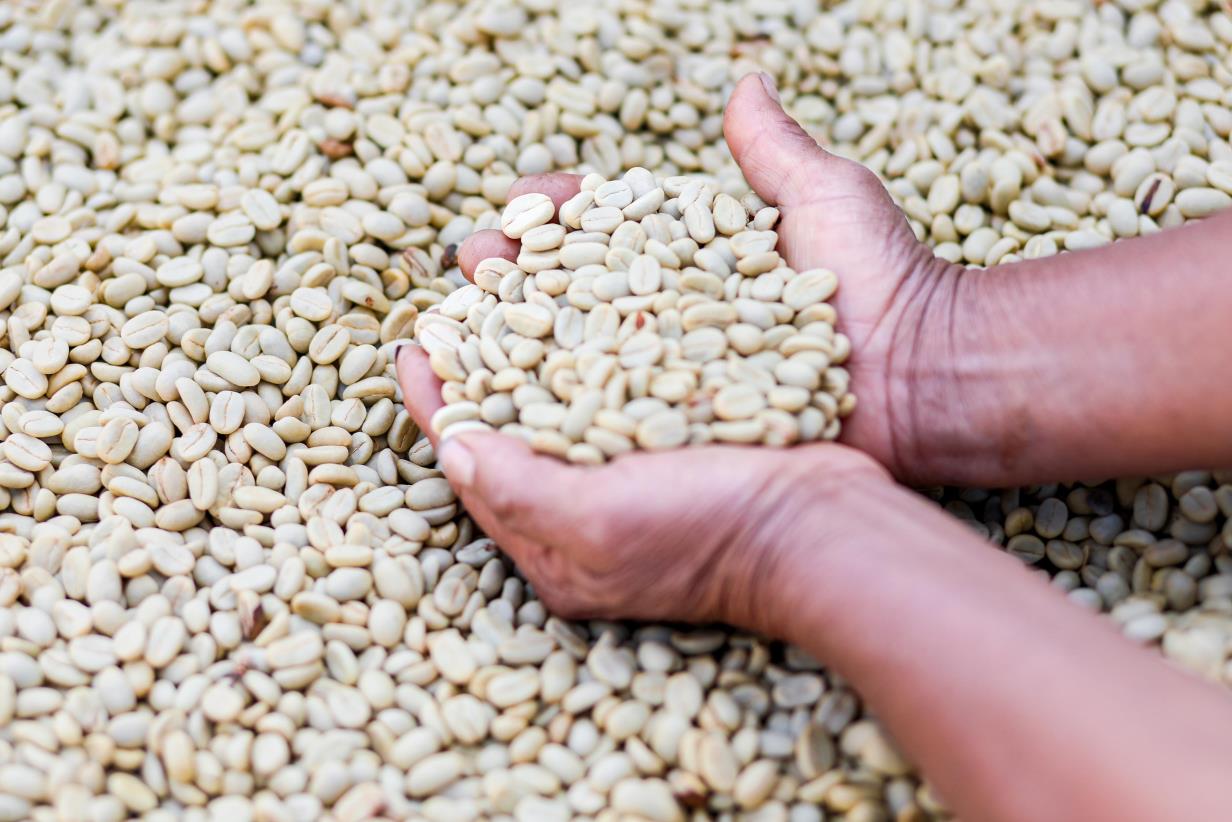
The hands behind a cup of coffee in Panama
Sustainable coffee production techniques build on Indigenous Peoples’ traditional knowledge
One project in Panama is helping to increase the income of Indigenous coffee producers by enhancing the production and sales of coffee. ©FAO/Cecilia Calatrava
02/10/2023
Long before the sun rises above the towering trees of the Panamanian rainforest, Elizabeth Méndez, a Guna Indigenous Woman, wakes up to the sound of her rooster crowing. She lives in a house made of bamboo and thatch, nestled deep in the lush green forests. This is where she and her family have been growing coffee for generations.
Elizabeth’s busy day begins with the distinct aroma of freshly brewed coffee, which for her, signifies much more than a morning kickstart to her day.
Coffee has long been an important source of income for many Indigenous Peoples in Panama. But, in recent years, these communities have struggled to maintain their traditional methods of production.
“I’ve been harvesting coffee since I was a little girl, but sometimes we didn’t understand what was going on with the plant: sometimes it looked sick, sometimes it would not yield much,” says Elizabeth.
“The other main challenge we’ve always faced is where and how to sell the coffee. When we harvest, sometimes we have nowhere to sell it and sometimes we sell it cheap,” she adds.
With the advent of an innovative project called “Support for post-COVID economic recovery for Indigenous coffee producers,” this is hopefully a scenario of the past for the coffee farmers in the Ngäbe, Guna, Emberá and Wounaan Indigenous Peoples’ communities participating in the project.
The project is an initiative of the Inter-American Development Bank (IDB) with funding from the Japan Special Fund Poverty Reduction Program. It was implemented with the technical assistance of the Food and Agriculture Organization of the United Nations (FAO) and with the support of Panama’s Ministry of Agricultural Development, as well as coffee company, Café Durán. The project’s goal was to increase the income of Indigenous coffee producers by enhancing the production, processing, quality and sales of coffee from sustainable agroforestry.
More than 150 Indigenous coffee farmers from four communities completed a season-long, FAO Farmers Field Schools’ training in sustainable agroecological practices that enhance resilience to climate change and improve the quantity and quality of production while being aligned with and building upon Indigenous Peoples’ traditional knowledge and cultural practices.
These agroecological techniques include minimizing the use of pesticides and adapting agricultural technologies to face the effects of climate change. Through guided discussion and observation, coffee farmers were empowered to become experts in ecology and oversee the agricultural management of their own coffee crops. The training also included learning activities to increase women’s participation in production and business decision-making.
“Thanks to the training, we’ve learned all about coffee management and how we can take care of plants when they get sick. All of this without the need to put aside our traditional techniques, and while preserving our ancestral native plants,” says Elizabeth.


By partnering with coffee company, Café Durán, Indigenous Peoples’ communities are accessing a new market that is reliable and pays fair prices. ©FAO/Cecilia Calatrava
More than just coffee
For Elizabeth and other coffee farmers in Panama, the project is not just about making good coffee, it is about building a better future for their families and communities.
“Coffee has always been part of our culture, but now we are also seeing it as a potential source of economic relief,” she explains.
By partnering with Café Durán and learning best practices for production and processing, Indigenous Peoples’ communities are accessing markets and buyers that are reliable and pay fair prices.
In turn, this allows coffee producers to improve their living conditions and offers opportunities for future generations.
“In a certain way, coffee is a magical product because it can, not only help with better social inclusion, but it also offers good international prices,” explains FAO Representative in Panama, Adoniram Sanches Peraci.
“Indigenous Peoples have tremendous cultural, social, linguistic, historical and territorial wealth. But they also face significant challenges when it comes to translating this wealth into sustainable economic opportunities, especially given their limited access to culturally responsive technical assistance, markets and financing,” says Ana Grigera, Gender and Diversity Specialist at the IDB.
“Coordinated work between government authorities, the private sector and Indigenous Peoples in Panama is key,” she adds.

Coffee has the potential to provide Indigenous Peoples’ communities with long-term economic, social and environmental sustainability. For this reason, it was chosen as part of FAO’s ‘One Country, One product’ initiative. ©FAO/Cecilia Calatrava
The perfect blend
When we ask Elizabeth how she expects her life to change, she tells us that she hopes life stays the same, and that she still wakes up at dawn to make her coffee. “But now the coffee will be from my own production,” she says with a warm laugh.
“Coffee provides Indigenous Peoples’ communities with long-term economic, social and environmental sustainability and offers them a reliable form of income. Previously, they worked on coffee farms. Today, with the experience that they have acquired from FAO’s Farmer Field Schools, they are the ones who are running their own coffee farms and selling it directly to buyers like us,” says Ricardo Tovar, Coffee Production Director at Café Durán.
“I’m encouraging the people of the community, especially the young, to get educated and grow their coffee crops the proper way. Coffee is not a quick solution for income generation for one or two years, but rather it is something that will guarantee our stability in the long term,” says Elizabeth.
One Country, One Product
In Panama, coffee is part of FAO’s One Country, One Product programme. This initiative places smallholders and family farming at the centre of the production, distribution and marketing of a selected product in each country. It also opens the possibility of fruitful cooperation with the private sector and financial institutions, such as the IDB.
“What we want to build is a platform of socio-economic inclusion of more farmers in the productive process, where the private sector has the market ‘know-how,’” says Peraci of the project.
FAO provides a wide range of technical assistance and investment support. Through its Investment Centre, FAO helps to transform agrifood systems for inclusive economic growth and a more sustainable future.
Related links
Learn more
- Website: FAO Investment Centre
- Website: FAO & Indigenous Peoples
- Website: FAO country profile: Panama
- Website: FAO en Panama (Available only in Spanish)

